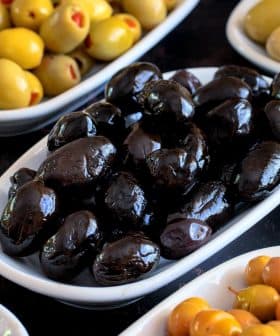Trade Deal Would Remove Tariff Imbalance for U.S. Olive Oil Producers
As American olive oil producers continue efforts to expand the market for their products, the Transatlantic Trade and Investment Partnership would provide significant relief to exporters.
 Dan Mullaney, Chief US Negotiator for the Transatlantic Trade and Investment Partnership (TTIP), and Ignacio Garcia Bercero, Chief EU Negotiator for the TTIP
Dan Mullaney, Chief US Negotiator for the Transatlantic Trade and Investment Partnership (TTIP), and Ignacio Garcia Bercero, Chief EU Negotiator for the TTIPThe Transatlantic Trade and Investment Partnership (TTIP) aims to facilitate trade and investment between the United States and the European Union, with negotiations focusing on market access, regulatory cooperation, and establishing rules. One of the main goals of the TTIP is to reduce or eliminate tariffs on goods exchanged between the two regions, benefiting industries such as agriculture, with potential economic benefits estimated to be significant for both the EU and the US by 2027.
The Transatlantic Trade and Investment Partnership (TTIP) concluded its most recent round of negotiations on April 29, 2016 in New York. A fitting place to have this meeting, as New York is a transatlantic trade hub with goods amounting to about $400 million arriving here daily from Europe. On the other hand, EU imports from the United States amount to more than $730 million every day.
A reduction or elimination of tariffs would, for the first time, allow U.S. producers an opportunity to offer European consumers additional choices in high-quality extra virgin olive oil.
The Transatlantic Trade and Investment Partnership was initiated in 2013 to facilitate the large exchange of goods such as food, clothing, pharmaceuticals, chemicals, and even cars on both sides of the Atlantic.
The purpose of the TTIP is to address global issues, increase jobs, and encourage economic growth and international competitiveness through increased trade and investment between the United States and the European Union.
See Also:Trade Commission Releases Report on U.S. Olive Oil Competitiveness
Since the launch of the partnership, the TTIP has had numerous negotiations in an attempt to meet its goals, which, according to press statement at the close of the TTIP talks in Brussels in February 2016, is one of the most ambitious trade agreement in history. The aim “is to bridge, where possible, regulatory divergences and promote greater regulatory compatibility — all without lowering the environmental, health and safety protections that our citizens have come to expect.”
In his address during the latest negotiations, chief US negotiator Daniel Mullaney said, “TTIP will not only eliminate tariffs, simplify procedures, cut red tape and bridge differences in our regulatory systems to the economic benefit of consumers, workers and businesses alike: it will also have a valuable strategic benefit as well.”
The TTIP negotiations centered on three major areas: market access, regulatory cooperation and establishing rules.
Under market access, the focus of the TTIP is on lowering or eliminating customs tariffs on both sides of the Atlantic. Reducing tariffs would greatly benefit US farmers, considering that the United States is the world’s largest exporter of agricultural goods. In 2013, US exported food and agricultural products worth more than $145 billion, of which $10 billion were to the EU.
As American olive oil producers continue efforts to expand the market for their products, the Transatlantic Trade and Investment Partnership would provide significant relief to exporters. At present, they pay $1,680 in duties per ton of olive oil shipped to EU, while EU producers only pay $34 per ton to the United States.
The breakdown of tariffs for olive oil imported to the United States from the EU is $0.05/kg on content and container weighing less than 18 kilograms, a rate that decreases to $0.034/kg on weights over 18 kilograms. In contrast, the EU tariff rates for less than 18 kilograms of olive oil imported from the United States is $1.57/kg net weight, which increases to $1.59/kg for higher volumes.
“Fair market access for competing products from many countries and producers is always the best way to empower consumers to choose what works best for them. This certainly applies to extra virgin olive oil,” said Kimberly Houlding, the president and CEO of the American Olive Oil Producers Association. “With fair access, extra virgin olive oils from all over the world can be appropriately compared on varietal, quality, freshness, flavor and price. A reduction or elimination of tariffs under the Transatlantic Trade and Investment Partnership would, for the first time, allow U.S. producers an opportunity to offer European consumers additional choices in high-quality extra virgin olive oil.”
In other areas, the TTIP aims to establish regulatory cooperation that will mean universal rules and regulations that will cover all aspects of a product ranging from labels to product tests and safety. Finally, the TTIP also intends to establish rules to protect intellectual property, use of propriety names and settle rules at the company and national levels.
Referring to the present meeting as “a round of very intense period of negotiations,” the EU Chief Negotiator, Ignacio Garcia Bercero, said that consumers and companies would feel an immediate impact on prices of some products.
A 2013 study conducted by the Center for Economic Policy Research in London estimates that the TTIP could boost the EU economy by 120 billion Euros and the US economy by 95 billion Euros by 2027.
However, it may be a while before the consumers and producers see changes in prices of imported goods. According to Blomberg BNA in Jan 2016, the EU Ambassador to the US, David O’Sullivan said, “TTIP could be concluded sometime in 2016 but probably would not take effect until 2018.”









